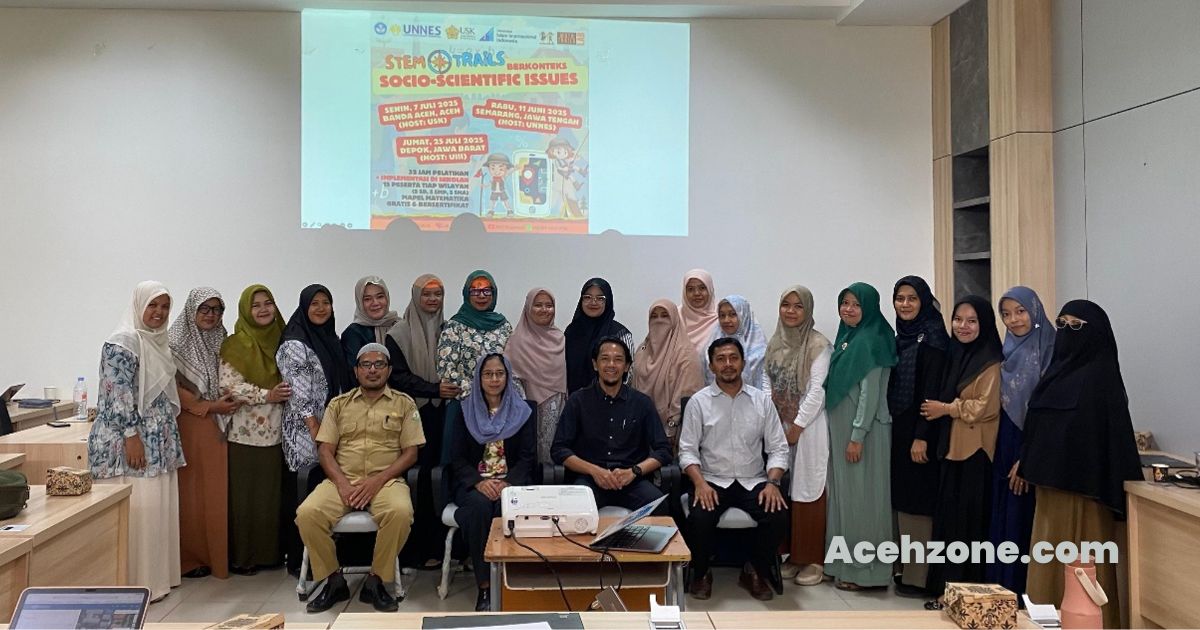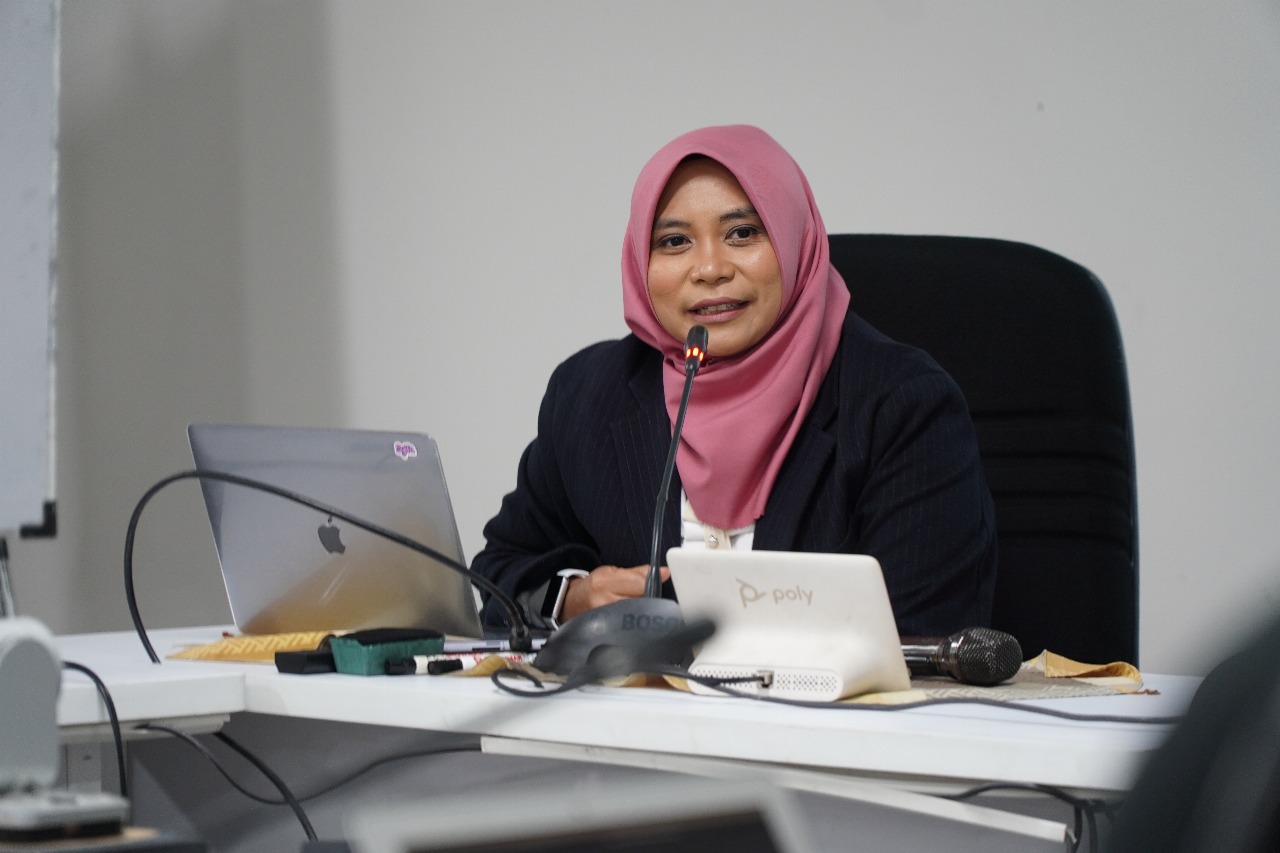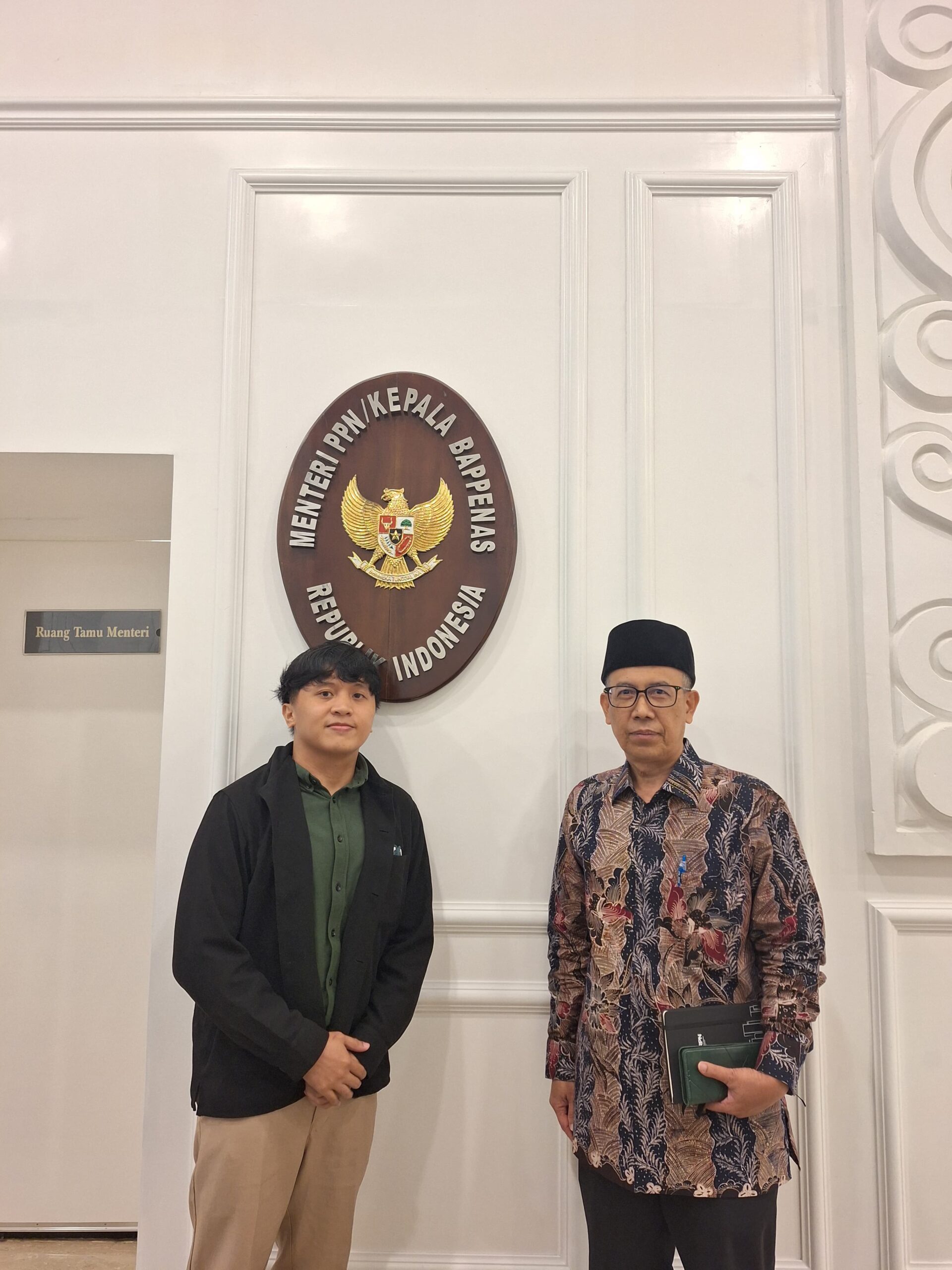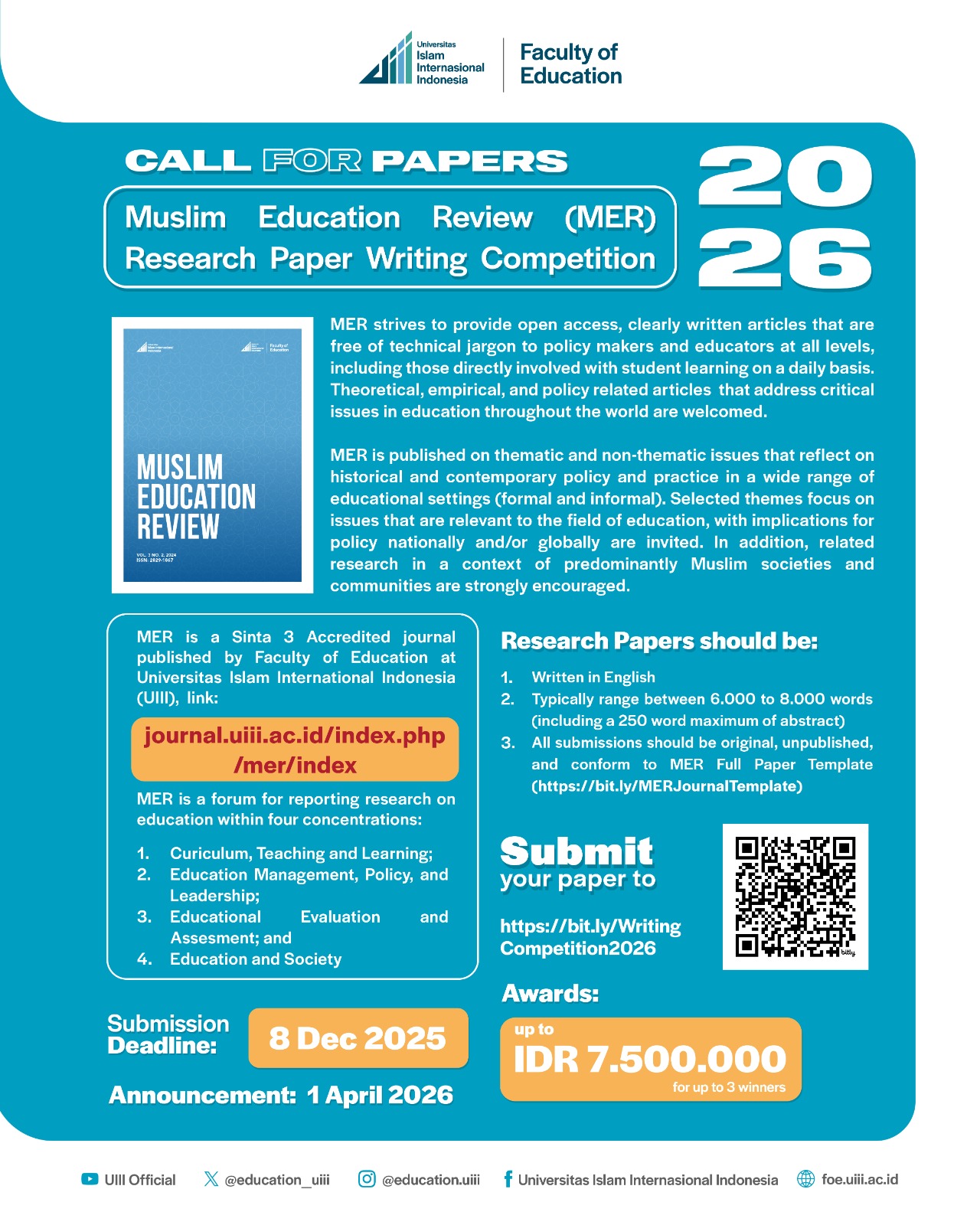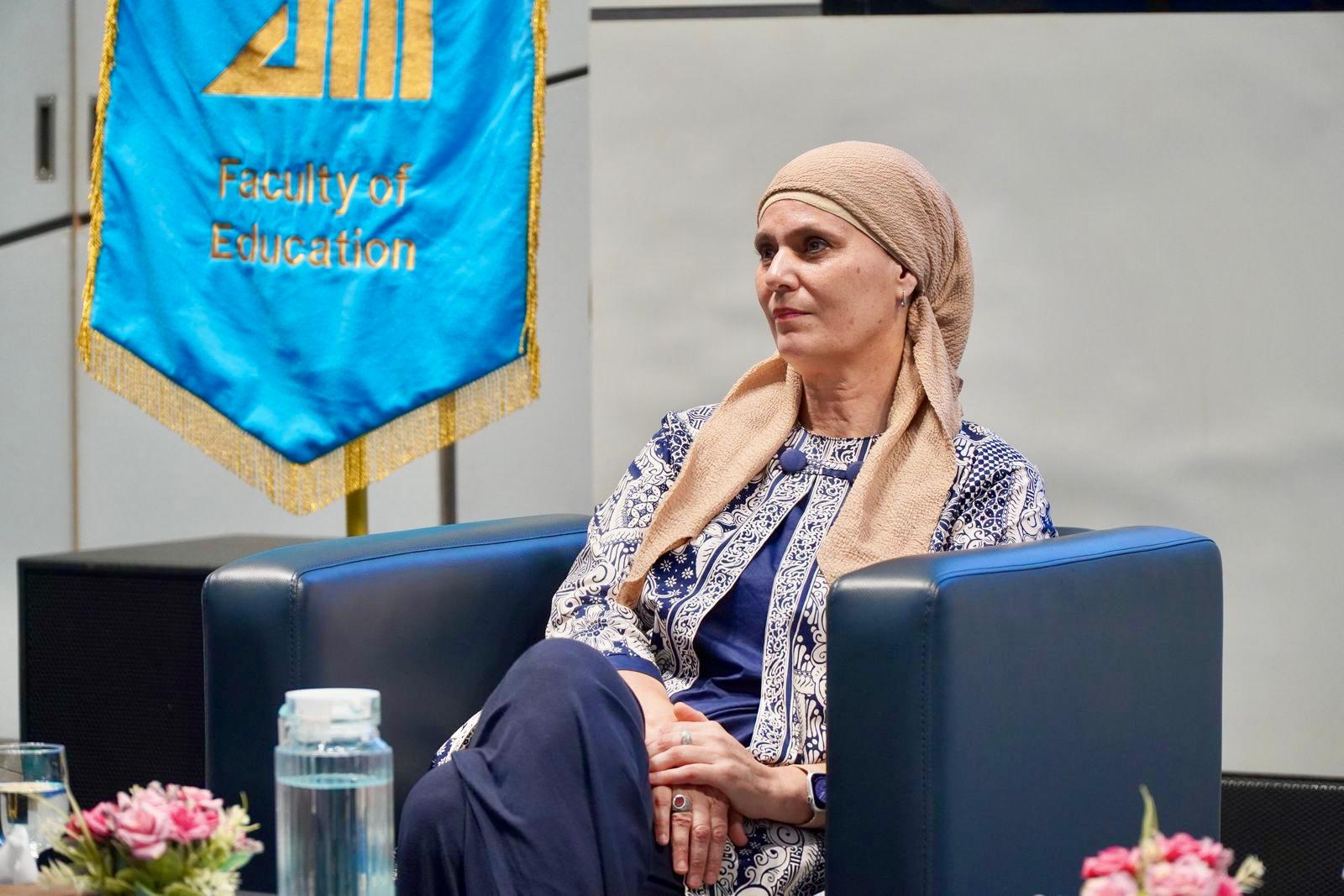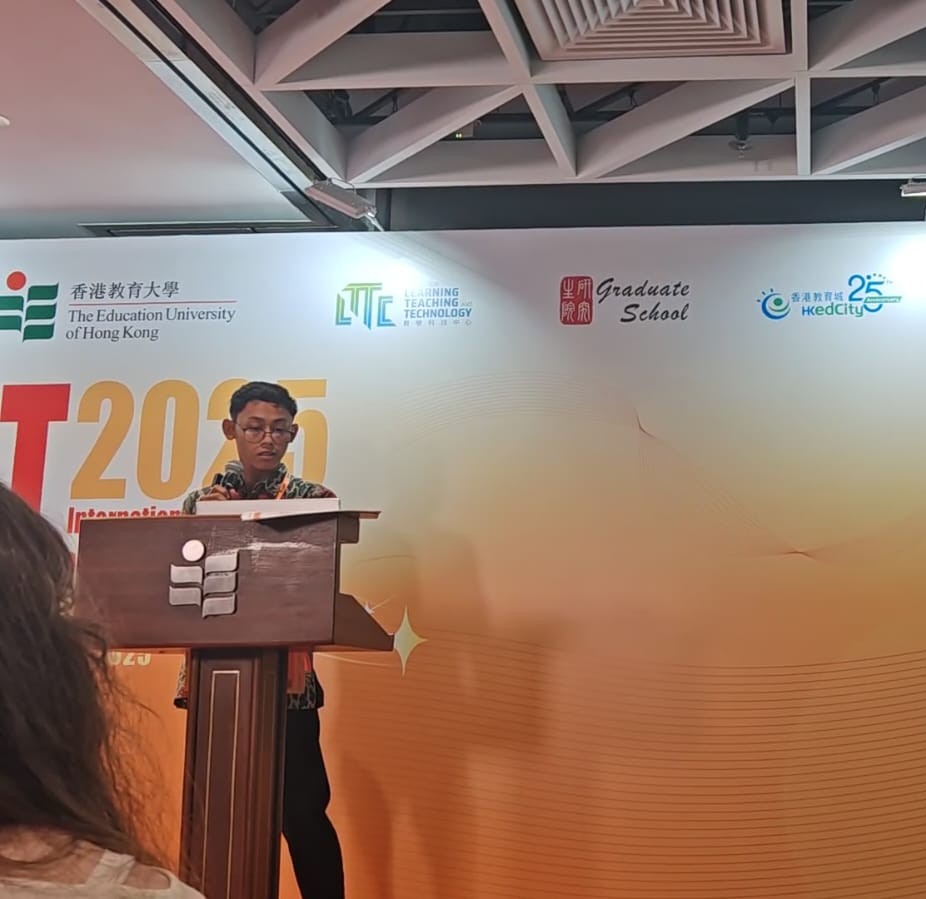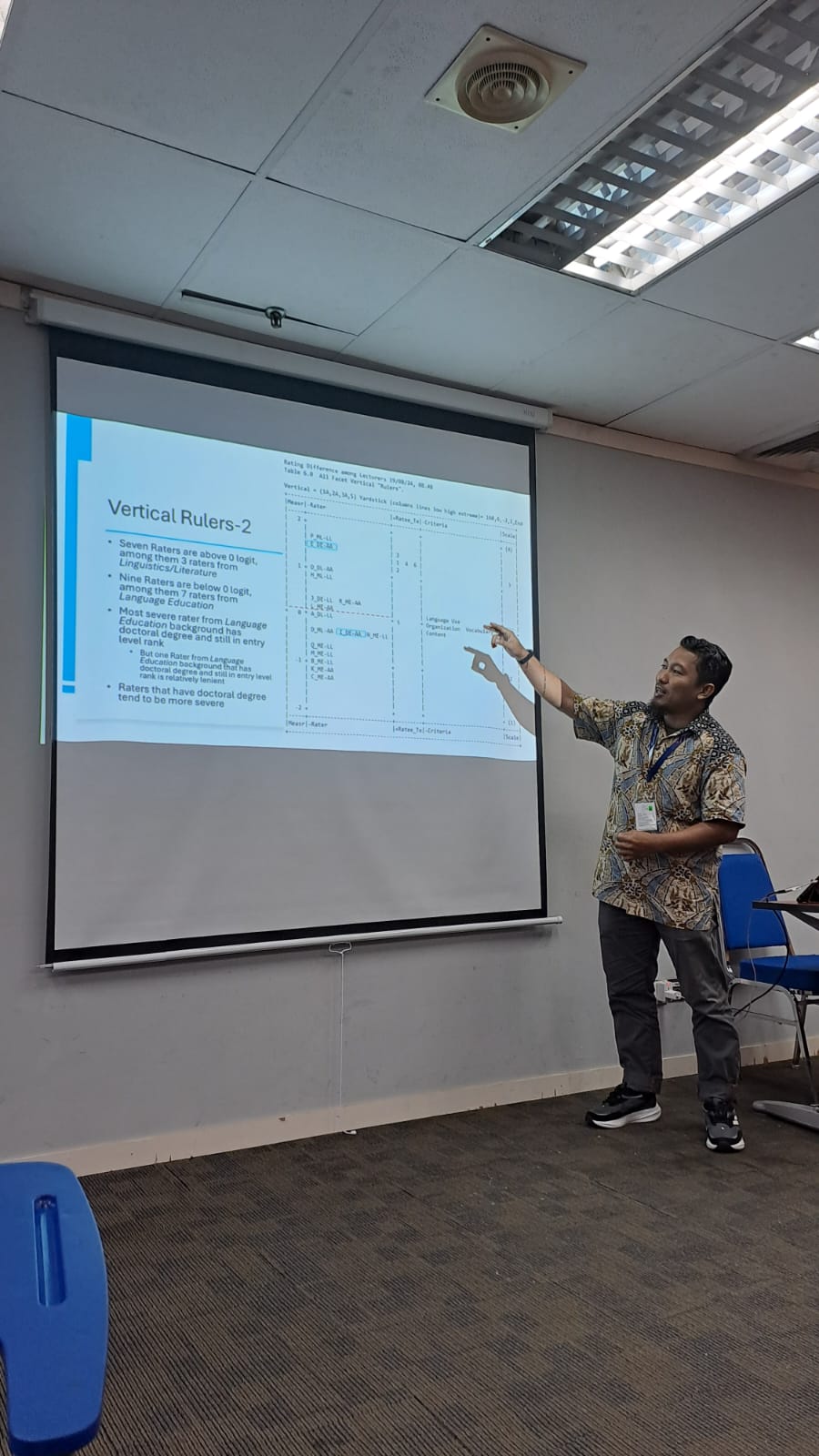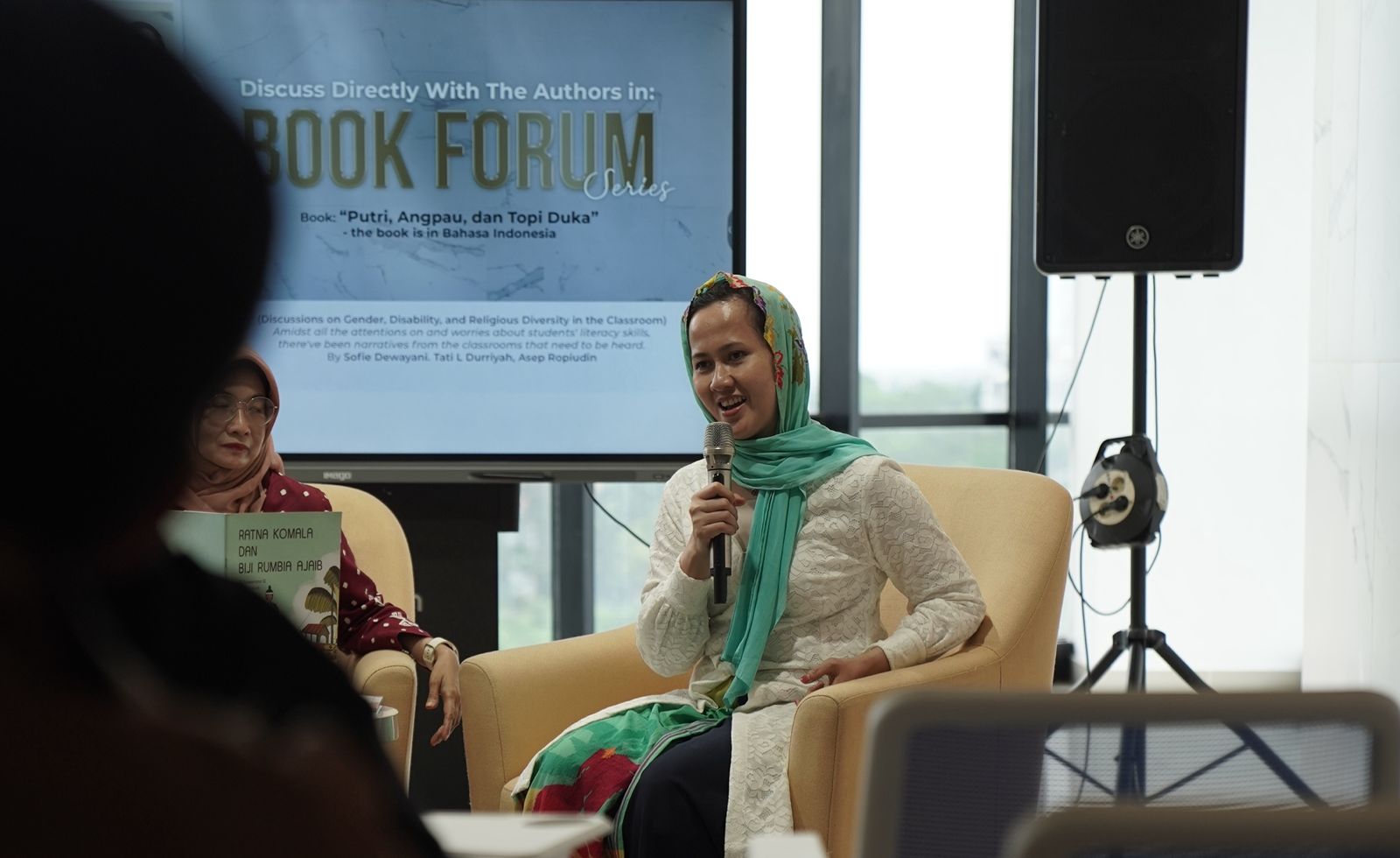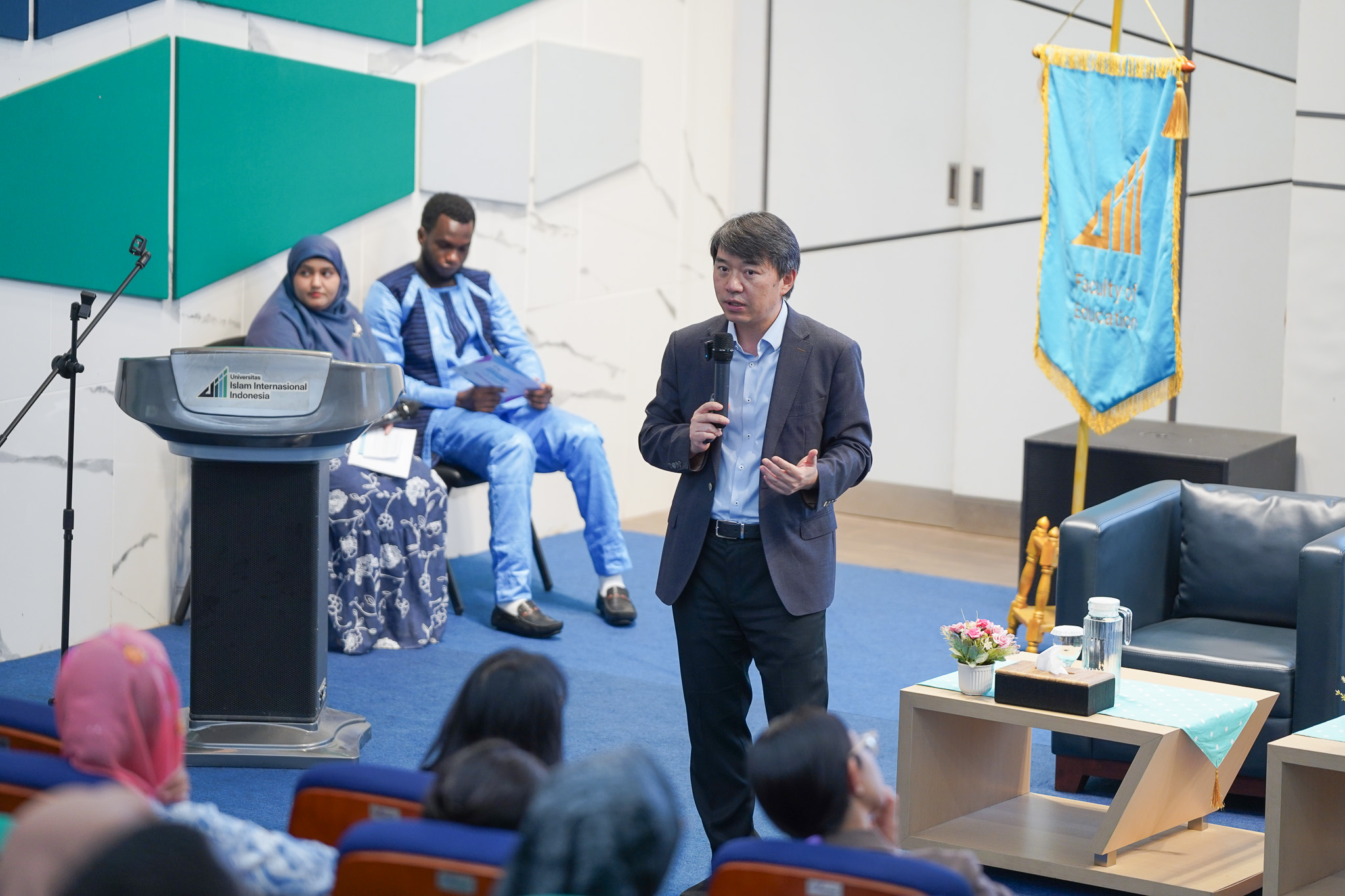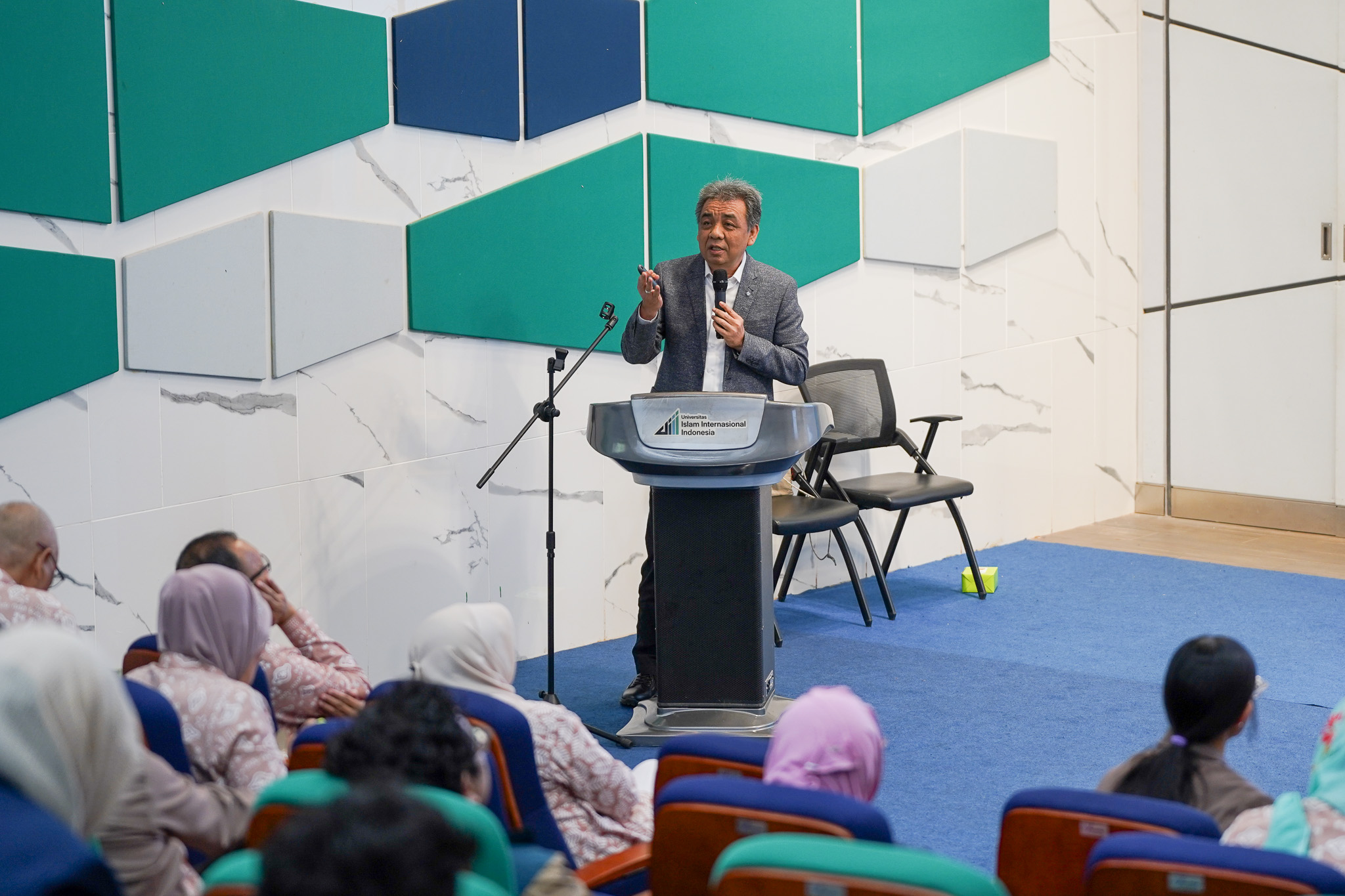Collaboration of Three Campuses Brings Forth STEM Trails in Aceh
 Collaboration of Three Campuses Brings Forth STEM Trails in Aceh
Collaboration of Three Campuses Brings Forth STEM Trails in Aceh
Banda Aceh (7/7/2025)—An innovative educational training program under the name STEM Trails with Socio-Scientific Issues was successfully held in Banda Aceh on Monday, July 7, 2025. This event was born from a collaboration between Universitas Syiah Kuala (USK), Universitas Negeri Semarang (UNNES), Universitas Islam Internasional Indonesia (UIII), and Math Trails Lab as part of the Indonesian Collaborative Research (Riset Kolaborasi Indonesia) program.
This training program, attended by elementary, middle, and high school teachers from various regions of Aceh, aims to provide educators with in-depth STEM teaching skills. Participants were supplied with 32 hours’ worth of materials, discussions, and hands-on implementation in their respective schools—all free of charge.
Three speakers were invited to facilitate this training session: Prof. Mailizar (USK) on STEM Learning, Dr. Adi Nur Cahyono (UNNES) on the concept of Math Trails, and Dr. Destina Wahyu Winarti (UIII) on integrating socio-scientific issues into learning.
Participants weren’t just passive recipients in this training, as they were also assigned to create and implement Math Trails in schools, which would then be documented into MathCityMap, a GPS-based educational application. Through this approach, mathematics is no longer a mere number-centered concept, but also a relevant, real-world experience.
This event is an endeavor to strengthen national-level synergy in developing a relevant and engaging educational framework that encourages critical thinking through deep learning. Banda Aceh serves as the first point in a series of national trainings, which will be continued in Semarang and Depok on later dates.
Organizing parties hope that this event can become a catalyst for educational transformation in Aceh as well as Indonesia. This cross-sector collaboration is expected to continue through mentoring, further research, and development of STEM-based learning models that can adapt to the ebbs and flows of time.
Empathy and Well-being: Values That Inspired Me as a Student Mom
 Empathy and Well-being: Values That Inspired Me as a Student Mom
Empathy and Well-being: Values That Inspired Me as a Student Mom
By Syifa Mufiedatussalam
Pursuing my Ph.D. at the Faculty of Education, I began my journey as a “healing” of my daily routine as an 8 to 5 worker. At that time, I thought this was my opportunity to gather with new friends from various countries, expand my knowledge, and of course, earn another degree.
This journey, however, was not without its challenges.
I never thought that the journey would be like a rollercoaster. My life, which was far from academic activities, turned into a life full of papers, reading, and writing. Moreover, I experienced my first semester during the pregnancy, together with overwhelming academic activities. Then I gave birth and raised a baby, who is now entering toddlerhood. I experienced all of this alongside my commitments as a PhD student and a working mom.
Through the initiation of the Faculty of Education, under the Dean Prof. Nina Nurmila, Ph.D, the university established a daycare. At that time, it was exactly 3 weeks after I delivered my baby. I felt how the faculty, in their very empathetic way, tried to fully support us. The faculty gently encouraged me to focus on my study, reassuring me that my child was in good hands. However, it doesn't mean that my journey then became smooth without obstacles. I experienced baby blues syndrome because my child was hospitalized almost every two months at that time. Meanwhile, at the same time, I had to submit my course papers and presentations. Moreover, I am aware of the limitations of my academic writing skills where I have to learn from scratch to catch up with my Ph.D. fellows. Nevertheless, I am very fortunate that until now, daycare has become a very important support system for me.
Beyond facilities, what truly makes me survives was the community. Alhamdulillah, I was blessed with a new family here. The faculty members were always ready to share their knowledge generously. When I knocked on their doors with questions, I was welcomed with patience and thoughtful responses. Their sincerity made learning feel like a shared journey. At the beginning of my Ph.D., I was particularly concerned about how the dissertation phase would unfold. I was worried that, as we each progressed into our individual research projects, we would become isolated—detached from our peers and overwhelmed by the demands of our dissertations. However, as the journey progressed, I realized that I was not alone. My supervisors accompanied me patiently through every stage of the research process, providing not only academic guidance but also emotional encouragement. I was also surrounded by fellow Ph.D. students from Batch I—people who became more than peers. We shared struggles, victories, and quiet encouragements. We lifted each other up, laughed through stress, and held on to hope together. That sense of brotherhood and sisterhood was priceless.
More importantly, the faculty demonstrated a deep awareness of this concern by establishing a structured system of bi-monthly Dissertation Progress Meetings. These meetings served as a vital space to monitor progress, however small, and to maintain a sense of momentum. They were not merely administrative check-ins; they became opportunities to receive constructive feedback, strategic recommendations, and positive reinforcement to help us overcome research challenges. These meetings gradually turned into our “Ph.D. Batch I family gatherings”—a moment of truth where we shared stories, laughter, struggles, and strengthened the bonds of friendship. In those spaces, we reminded one another that we were never alone on this journey. What changed the most was me.
In the course on education and pluralistic society, A/Prof. Charyna Ayu Rizkyanti, Ph.D introduced us to empathy. I never expected that we would learn about empathy in the Faculty of Education. However, since that moment, I started to fall in love with empathy. I reflected that, it turns out, the value of empathy aligns with the religious moderation promoted by the university. Since then, the direction of my dissertation research shifted to empathy and well-being, which of course is supervised by her. Empathy and well-being—concepts taught not only as theories but modeled in practice—became values I deeply internalized. Not just as my research topics, but as ways of living. I witnessed how empathy creates space for understanding, healing, and personal transformation. I saw how these values allowed us to grow together—as individuals, as scholars, and as a community.
UIII taught me to see knowledge as a form of worship. Research became not just a task, but an amanah. I learned to align my intention with service—to my community, my faith, and the broader world. That shift turned every paper, every reading, every sleepless night into something meaningful. When I first joined UIII, I felt like an empty glass. Having been away from formal academic settings for several years, I entered the program with humility and awareness of my limitations. But through rich discussions, rigorous coursework, and the guidance of dedicated lecturers, I began to grow. And while I continue to discover how much I do not yet know; I now feel that my 'glass' has grown—perhaps into a bucket—ready to be filled even more. I am being filled not only with knowledge, but also with deeper questions, broader insights, and the confidence to contribute with purpose.
With this perspective, I have begun to give back. I provided private consultancy to a friend who was developing an Islamic elementary school (SDIT). I have also had the opportunity to support teachers in pesantren communities—sharing what I have learned while continuing to learn from them. These contributions are not mine alone; they are the fruit of the relationships, inspiration, and knowledge I gained during my time at UIII.
As I near the end of this journey, I carry a prayer in my heart: that all of us in this first cohort will graduate together, on time, with hearts full of gratitude and knowledge that blesses others. I hope we will continue to support each other, to share, and to grow beyond this academic journey.
To my fellow students and those who will come after us: come with humility. Empty your glass. Make room for what this place offers. You will be amazed at how much you grow—together with this institution, hand in hand with its vision.
And to UIII: may you always be a home for those seeking not only knowledge but also purpose. Thank you for supporting me in becoming who I am today. This journey shaped my mind and touched my soul. I will always carry it in my heart with gratitude and humility.
Education and Society - Study Visit to Bappenas
 Education and Society - Study Visit to Bappenas
Education and Society - Study Visit to Bappenas
by Ihsan-Isah Imam Zaman
On Tuesday June 17, 2025, the Batch 4 MA students of the Faculty of Education at Universitas Islam Internasional Indonesia (UIII) have successfully conducted their study visit to the Ministry of National Development Planning, also known as Badan Perencanaan Pembangunan Nasional (BAPPENAS). This wonderful opportunity is largely thanks to the strong collaboration between BAPPENAS and UIII in their efforts to improve the quality of higher education and research in Indonesia. This study visit is part of the learning experience of the students that will help them gain an improved understanding of the course Education and Society.
As a Muslim-Filipino who has been fortunate enough to be part of the Faculty of Education in UIII, I am very grateful to have been part of this learning experience. Personally, I have not even been to the equivalent government agency of BAPPENAS in the Philippines. That is why I could not help but try to maximize the experience as much as possible. As an aspiring researcher interested in policymaking, education and research in national level, this study visit has been quite rewarding and beneficial.
The study visit has reminded me of when I was applying to UIII as a postgraduate student. When I was writing my motivation letter, I was trying to bare my passion and dedication to the common good through my writing. Somehow, I find myself consistent in my belief that education has really powerful impact in turning the life of an individual or community for good. Without a single doubt in my mind, I strongly believe in the power, importance and value of teachers and educators in improving the condition of society and empowering individuals.
From my personal encounters in my country, I have seen firsthand how expensive it is to be poor, especially in education. I have observed how some marginalized people seem to have been forgotten by the vast majority. Despite the existing government policies, there seems to be no improvement at all. I used to wonder if it is simply a phenomenon of social apathy or some communities are just bound to experience social exclusion. These reflections may not fully represent what truly drives me to pursue higher studies, but one thing I have realized is that I need to learn more— because passion and intention alone cannot bring about tangible change.
In the faculty of education, it is mandatory for the MA students to take the course Education and Society. In this course, we are learning about the relationship between education and other disciplines that contribute to social development and shape social progress. We learn how politics, culture, society and religion influence education and also how education affects them in return. To be honest, this course has truly helped me develop a more structured way of thinking about the factors that affect education. Prior to starting my postgraduate study, the way I think was often either too one-dimensional or too scattered. Somehow, I knew that there were various factors at play but my grasp of them was still immature.
 Talking more about the study visit, we first went to the gallery of BAPPENAS. Inside the gallery, we have been captivated by the simple but meaningful displays that help us visualize the past, present and future endeavors of BAPPENAS. During that brief tour, we have been introduced to the key events and figures of the ministry. The artistic representation of their works is all interesting but what caught my attention the most was the section about Blue Economy. This concept is relatively new for me and even in the Philippines this is still in emerging stage.
Talking more about the study visit, we first went to the gallery of BAPPENAS. Inside the gallery, we have been captivated by the simple but meaningful displays that help us visualize the past, present and future endeavors of BAPPENAS. During that brief tour, we have been introduced to the key events and figures of the ministry. The artistic representation of their works is all interesting but what caught my attention the most was the section about Blue Economy. This concept is relatively new for me and even in the Philippines this is still in emerging stage.
Why did I get hooked on the Blue Economy when I should be focusing on issues and trends in Education? I guess it is because, in some way, this concept speaks to my identity. First of all, I am from a tribe whose name is derived from a term that means ‘The people of the lake’. Then growing up, I keep hearing the stories about my grandparents being fishers. My father used to help my grandfather fish for a living, which helped support his and his siblings’ education. People do not choose the circumstances or reality that they will be born into, but the social contract demands that those who take on political power have a responsibility to craft and implement policies that support people from all walks and conditions of life. In this regard, education plays a crucial and irreplaceable role.
Afterwards, we also had a brief but comprehensive lecture from BAPPENAS about the process of education policymaking, which involved not only rich theoretical discussions but also practical insights. There were a lot of topics covered and my batchmates raised interesting questions that were appreciated by the experts for their critical relevance. I would like to highlight the topic about out of school children because it is quite an important issue in education especially when we talk about the idea of no child left behind or better yet, no one left behind. In our first semester, I used to talk about juvenile delinquency and out of school youth which I previously struggle to find similar topic about in Indonesian context. Thanks to this session, I found out that similar topics are being studied by some of my batchmates and it also align with the current efforts of BAPPENAS. From my perspective, the impact of social exclusion can be felt from as early as childhood. This is why there are more researchers highlighting the importance of early childhood education.

Our batch is truly grateful for the iniative of the Faculty of Education and our lecturer in this course, Dr. Amich Alhumami, Ph.D, who also serves as the Deputy Minister for Human Development and Cultural affairs. Placing this session near the end of the course and semester has helped us connect theoretical insights with practical experience. I have come to understand more clearly that the broader the scope of the research, the more it needs not only a high level of expertise, but also empathy and a strong sense of humanity. The greater the scope, the more people are involved, and the more lives affected by its outcomes.
Call for Papers: Writing Competition 2026
 Call for Papers: Writing Competition 2026
Call for Papers: Writing Competition 2026
MER is a Sinta 3 Accredited journal published by the Faculty of Education at Universitas Islam Internasional Indonesia. We invite a wide range of topics in education especially those that are within the journal scopes.
MER is a forum for reporting research on education within four concentrations:
* Curriculum, Teaching and Learning;
* Educational Management, Policy and Leadership;
* Educational Evaluation and Assessment;
* Education and Society.
Submission papers should be written in English and typically range between 6,000 to 8,000 words (including a 250 word maximum of abstract).
All submissions should be
* Original;
* Unpublished;
* and Conform to MER Full Paper Template: https://bit.ly/MERJournalTemplate
Submission link: https://bit.ly/WritingCompetition2026
Awards
The awards include cash payment of up to IDR 7.500.000 for up to 3 winners.
Important Dates
Full Paper Submission: December 8, 2025
Awards Announcement: April 1, 2026
To see previous MER publication, please click this link: bit.ly/MERJournal
Beyond Science: Prof. Anna Gade’s Vision of Sustainability in Higher Education
Beyond Science: Prof. Anna Gade’s Vision of Sustainability in Higher Education
June 11, 2025
Contributor: Supriyono | Editor: Dadi Darmadi | Photo: Virda Lalitya Umam
In an engaging Lunch Talk #41 at the Faculty of Education titled “Environment & Sustainability in Higher Education: Theory and Practice,” Prof. Anna M. Gade, a Visiting Professor at UIII from the University of Wisconsin-Madison, USA, challenged conventional narratives around environmental studies and sustainability in academia, reflecting critically on the origins, definitions, and future directions of environmental education.
Starting with a narrative familiar to North American academia, Prof. Gade traced the roots of environmental studies to the field of environmental science, a discipline often grounded in natural resource management and natural sciences such as chemistry, biology, and earth sciences. However, she highlighted a critical limitation of this framing: the absence of people.
“The interaction of biotic and abiotic factors is how environment is formally defined. But where are people in this picture?” Prof. Gade asked a provocative question, as she portrayed a slide of a picture of mangrove forest in an Indonesian beach describing what environment is. This question underscored a persistent tension in environmental education the divide between scientific and humanistic approaches.
She argued that environmental studies must go beyond science to encompass humanities, social sciences, ethics, and cultural understandings, particularly for regions like Indonesia, where local knowledge and community practices shape environmental realities. She emphasized that even though the terminology of “environment” might seem recent, its conceptual roots, especially within Islamic traditions, reach back centuries.
A key takeaway from Prof. Gade’s talk was her assertion that environmental studies are fundamentally interdisciplinary. “It’s not just about adding people into the mix of natural sciences,” she said. “It’s about genuinely integrating diverse fields — from theology to engineering, from ethics to biology — to form a comprehensive understanding of our environmental challenges.”
Using the powerful symbol of the tiger, she illustrated how the survival of charismatic species like the Sumatran tiger is interwoven with cultural practices, local governance, and community relationships with nature. This, she argued, is where humanistic disciplines like religious studies and ethics become essential partners to science in environmental education.
Prof. Gade also critiqued the emerging discourse around sustainability, a concept whose foundations lie in international development, business, and systems thinking. She questioned the reliance on frameworks such as the Brundtland Report or simple lists of Sustainable Development Goals (SDGs), noting that while these offer practical guidance, they often lack deep ethical grounding.
“Sustainability becomes more than just an unstable word,” she reflected. “It calls us to consider our obligations to future generations, to rethink systems of production, and to integrate complex social, economic, and environmental considerations into our curricula.”
Prof. Gade’s presentation was not only an academic reflection but also a provocation for UIII and other universities in Indonesia. She urged educators to design programs that are genuinely interdisciplinary, that draw on Islamic intellectual traditions, and that embed ethical reasoning into environmental and sustainability studies.
Her message was clear: to address today’s environmental crises, higher education must not merely replicate models from the Global North but must cultivate approaches that are locally grounded, ethically robust, and inclusive of diverse worldviews. This aligns perfectly with UIII’s commitment to integrating global insights with local and Islamic perspectives, ensuring environmental education is both meaningful and transformative.
source: https://uiii.ac.id/beyond-science-prof-anna-gades-vision-of-sustainability-in-higher-education/
From Fear to Courage: Reflections on International Conference on Teaching and Learning (ICLT) 2025 Hong Kong and the Aspirations of Indonesian Education in an Era of Disparity
 From Fear to Courage: Reflections on International Conference on Teaching and Learning (ICLT) 2025 Hong Kong and the Aspirations of Indonesian Education in an Era of Disparity
From Fear to Courage: Reflections on International Conference on Teaching and Learning (ICLT) 2025 Hong Kong and the Aspirations of Indonesian Education in an Era of Disparity
By: Muhamad Maulana
“The flight ticket was non-refundable, and my wallet was nearly empty. I was sitting by myself and wondering, “Perhaps this journey isn’t meant to happen.' But then, came an unexpected kindness, my friends—without hesitation—extended their support, lending me what little they had to keep my dream alive. This is more than just an account of attending the international conference, It is a story that changed the way I think about education, and how I see myself—as Indonesian scholar who strongly believes the power of education.”
As my first international trip beyond Indonesia, and naturally I felt nervous. I arrived with do not have any idea how to navigate foreign systems, and the idea of being alone in an unfamiliar place was challenging. But with each step, I learned to stand by myself, from mastering public transportation to adjusting a new culture, I slowly developed confidence. I realized that independence isn’t about having all the answers—it's about being strong enough to keep moving forward despite uncertainty.
The Conference theme, “Learning and Teaching for Future Readiness,” gave me a significant experience as a master candidate in Education. The International Conference on Teaching and Learning (ICLT) 2025 was vibrant filled with keynote speakers from well-known universities and presenters with diverse, cutting-edge research. One of the keynotes I looked forward to being study by Professor Deng Zongyi from University College London. His lecture titled, “Rethinking 21st-Century Competencies and Curriculum Translation: Insights from Bildung-Centred and Subject-Matter Didaktik,” resonated deeply with me. He reminded us that these competencies cannot be reduced to mere technical proficiencies, but position them as cultural artifact, shaped by historical, philosophical and pedagogical context. As someone currently working on completing a thesis talking about 21st-century competencies, I found his insights was transformative and I should reevaluate my own work.

Another keynote that impressed me most was Professor Hong Ji from the University of Arizona, discussing his material titled “Reconceptualizing Teacher Identity in Changing and Challenging Contexts,” enlightened me to the multifaceted identity of teachers. She spoke about how teacher identity is constantly negotiated, shaped by social expectations, policy demands, and personal values. This talk particularly hit home because I’m currently working on a collaborative research project with peers about professional teacher identity in private Islamic schools (madrasah) in Indonesia, deeply rooted in the religious values and viewing it as a good deed, which we’ll present at the upcoming AIFIS-MSU Conference on Indonesian Studies 2025.

Walking onto the campus of The Education University of Hong Kong for the first time was itself an inspiring moment. The campus felt futuristic—both in design and spirit. What amazed me was the sheer number of student researchers presenting on topics such as artificial intelligence in education, a field that is increasingly shaping global educational conversations. Their work was fresh, forward-thinking, and well-supported by robust facilities. Compared to these presentations, my own research felt incredibly local: a study I had conducted for my Educational Management and Leadership class, with the titled “Empowered or Excluded: Exploring Student-Workers’ Perceptions of Power Dynamics in Educational Leadership.”
 At
At
First, I was worried that my topic might be irrelevant to international audience. My research focused on a very specific and local problem of education in Indonesia: the shortage of qualified teachers in low-middle class society, and how this is often resolved by hiring locals’ members who do not have teaching degrees yet to fill the gap temporarily. In contrast, countries like the U.S. Hong Kong or those in Europe are already addressing more advanced educational concerns—AI policies, curricular sustainability, and or digital equity. But during the discussion, I realized that sharing our local realities is equally important, because global conversations on education must involve voices from all contexts, especially those still grappling with basic structural concerns.
Listening to scholars work from different part of the world, I became even more aware of how far Indonesia need to improve the quality of its education system. But rather than becoming discouraged, though, I felt a growing sense of purpose. Being Indonesian academician, I left Hong Kong not only with new perspectives but with a deeper conviction: education is not only national responsibility, but a personal commitment as well. Indonesian education’s future depends on its young scholars, teachers, and researchers who dare to dream—and act boldly—beyond national borders.
Looking back with profound gratitude, having generous friends gave me courage to go and did not cancel the trip despite fear. What I gained extends far beyond the conference sessions themselves, the lessons I brought home all became part of a story I’ll carry with me as I continue the journey in education. The ICLT 2025 conference did not simply teach me about future readiness in education—it helped me become ready for my own future.
From PhD Research to International Audience: My Learning Journey on Educational Assessment and Rasch Measurement Theory

From PhD Research to International Audience: My Learning Journey on Educational Assessment and Rasch Measurement Theory
By Muhammad Affan Ramadhana
I was driving when the email notification from PROMS 2025 committee arrived. I peeked through my smartwatch but could only see the subject headline: Congratulations – Distinguished Student Scholarship PROMS2025.
Having arrived home, I tried to read the email word-by-word, in case I misread it. Alhamdulillah. My plan to present my research at the conference is saved. I was awarded travel grant to attend and present at the conference. This award is given by Pacific Rim Objective Measurement Society (PROMS) and Singapore University of Social Sciences (SUSS) as the committee of PROMS conference this year. I did not expect much when I submitted the application. I just thought that it is better to fail while trying than to regret never trying.
“The award recognizes outstanding students across Southeast Asia who have demonstrated academic excellence, research potential, and a commitment to advancing the field of measurement and assessment.” (PROMS 2025 website).
My Research Background
I was trained academically in English language education field. I obtained my Bachelor of Education degree in 2011 and my Master of Education in 2014, both from Universitas Negeri Makassar (UNM), South Sulawesi province, Indonesia. Since 2022, I was admitted to the PhD Program at the Faculty of Education, Universitas Islam Internasional Indonesia (UIII). I did my undergraduate thesis on English test analysis using classical test theory. Now, my doctoral research focuses on educational assessment and evaluation, with specific interest in language testing and assessment, rater-mediated assessment, and Rasch measurement theory.
It was in the Educational Assessment class, when I was first introduced to Rasch measurement model by Dr. Bambang Sumintono. As one of prominent figures in Rasch measurement in Indonesia, he clearly explained several traditions in measurement model and present a solid argument on why using raw score in measurement is problematic. Later in the following weeks, I was introduced to multi-rater assessment – a concept that I later used in my dissertation research.
My dissertation specifically explores assessment behavior of Indonesian university lecturers when grading English essays. This research focus emerged from my experience listening to stories of how my colleagues admit inconsistencies when assessing students’ writing. In rater-mediated assessment, inconsistencies and biases can be a threat to validity, reliability, and fairness of the assessment, which can impact the students’ future opportunities.
My dissertation research utilizes Many-Facet Rasch Measurement (MFRM) analysis, which is a modern psychometric model built on the idea that observed ratings are influenced by multiple facets, where each contributes to the final measurement. These facets include examinee ability, rater severity, and assessment rubric criteria. MFRM allows estimation of the logit scale for each facet and adjustment for inconsistencies. This model is important for identifying systematic biases or interactions that may be introduced by indirect factors.
From PROMS 2024 to PROMS 2025: My First Steps in the International Arena
Participating in PROMS 2024 provided a very valuable first-time experience for me. PROMS, as a scholarly society that promotes objective measurement and Rasch measurement, provides a forum for researchers from various backgrounds to share their works. In the 2024 conference, I directly witness the presence of leading experts in the field of Rasch measurement, such as Prof. Trevor G Bond (Founder of PROMS), Prof. George Engelhard (President of PROMS), and Prof. Yan Zi (Vice-President of PROMS), among others. These names I previously knew from books and journal articles only.
I was just started to deeply learn about this field when I participated in PROMS 2024 in Kuala Lumpur, Malaysia last year. I actually did not understand most of the theory when I presented my preliminary study. It was just my strategic action to gain insights and measure the worthiness of my plan and preparation for dissertation research. But I did my best. The feedback that I received, both from Rasch experts and from language assessment experts, resulted in substantial refinements to the analytical framework and methodology of my dissertation research. This experience also strengthened my determination to continue exploring this field.
Upon browsing the PROMS 2025 website, I noticed that the committee of this year’s conference opened applications for Distinguished Student Scholarship. I have just finished analyzing data from the first phase of my dissertation research when I saw the opportunity. I immediately prepared my extended abstract, curriculum vitae, and most importantly, recommendation letter from dissertation supervisor. He strongly supported me and believed that participating in PROMS 2025 will provide valuable feedback at the crucial stage of my dissertation research.
In PROMS 2025, I will present the result of first phase of my dissertation research. In the study, I analyzed assessment behavior of 36 university lecturers in Indonesia. They were tasked to assess English essays written by undergraduate students from various Asian countries. The assessment was conducted using standard analytical rubric with five categories (content, organization, vocabulary, language use, and mechanics).
The analysis indicates the presence of at least three groups of raters based on their level of severity/leniency with significant differences across raters. The statistical fit analysis also identified raters who exhibited inconsistent scoring behavior (overfit and misfit). The most interesting finding of this study was the identification of biases between rater background and scoring criteria. The results show different assessment behaviors of lecturers based on their academic qualifications, field of study, professional rank, and gender. This study is expected to offer practical insights for assessment committees to minimize potential biases, especially when designing multi-rater English writing assessment programs
My Future Plans
Receiving this scholarship will provide me with the opportunity to present some of my dissertation findings at the PROMS 2025 conference. The main event will be held on July 22-23, 2025, located in Singapore University of Social Sciences (SUSS) campus. The Distinguished Student Scholarship presentation session is scheduled for the afternoon of Day One. I believe the scholarship will provide me with a platform to gain insights and interact with leading experts and colleagues from across the Pacific region and beyond. I believed the forum will help me expand my professional network into the field of objective measurement.
I am very grateful for this opportunity and the recognition given through the PROMS 2025 Distinguished Student Scholarship. I believe research focused on improving educational practices, no matter how small, can have international relevance. I hope to make the most of this opportunity to learn from experts, share my research findings, and continue to contribute to the development of the field of educational measurement and language assessment, particularly within Rasch measurement theory.
UIII Hosts Book Forum Highlighting Gender, Disability, and Religious Diversity in Classrooms

UIII Hosts Book Forum Highlighting Gender, Disability, and Religious Diversity in Classrooms
May 15, 2025
Contributor: Supriyono | Editor: Dadi Darmadi | Photo: Alief Fathan
In an effort to amplify classroom voices and enrich the national conversation on students’ literacy and inclusivity, the Jusuf Kalla Library at UIII held a Book Forum featuring the authors of ‘Putri, Angpau dan Topi Duka’. The event offered a space for reflection and dialogue on how children’s literature can be a powerful medium to discuss gender, disability, and religious diversity in educational settings.
The book, written in Bahasa Indonesia by Dr. Sofie Dewayani, Dr. Tati L. Durriyah, and Asep Ropiudin, was the product of a two-year collaborative research project involving educators from multiple universities and foundations across Indonesia. Moderated by Asep Ropiudin himself, the discussion centered around how classrooms can become spaces to introduce social issues for children utilizing meaningful stories and literature.
“Seeing this book physically—it feels like a dream,” said Dr. Tati L. Durriyah, recalling the project’s beginnings during the COVID-19 pandemic in 2022. “It took years of hard work, delays, and collaborative efforts. We designed this book specifically for practitioners, using accessible language and authentic classroom experiences.”

The book follows the experiences of three master teachers from various regions of Indonesia as they navigate discussions on identity and inclusion through literature in their classrooms. These stories, the authors argue, are often overlooked in national discourses around students’ literacy, which tend to focus on rankings and generalized assumptions.
Dr. Sofie Dewayani emphasized the importance of listening to students’ stories, noting, “When we zoom in to the classroom level, there are powerful narratives created by children. If we truly listen to them, we’ll realize they are literate—they just need something to connect with.”
She shared one example from the book in which a teacher introduced the story of Ratna Komala, a tale that reverses traditional gender roles with a brave sister rescuing her brother. “This flips the usual portrayal of women as passive figures awaiting rescue,” Dr. Dewayani explained. “And it prompted a classroom conversation about women’s roles in society, even touching on issues like why women might not receive holiday bonuses.”
The forum also highlighted another story in the book about the friendship between an Indonesian girl and an Afghan refugee—used in class to foster dialogue about borders, identity, and shared humanity. “We believe a book comes to life only when a teacher facilitates critical discussion,” said Dr. Dewayani.
In a time when there is growing concern over students’ literacy rates and reading habits in Indonesia, the forum underscored the importance of going beyond numbers to spotlight lived experiences and classroom conversations. By sharing these teacher-led stories, the book encourages educators to approach literacy not just as a skill, but as a gateway to critical thinking, empathy, and inclusivity.
Professor Yan Zi’s Call for Rethinking Assessment in the Age of AI

Professor Yan Zi’s Call for Rethinking Assessment in the Age of AI
May 14, 2025
Contributor: Supriyono | Editor: Dadi Darmadi | Photo: Achmad Jatnika
At the 4th Annual Conference hosted by UIII Faculty of Education, Professor Yan Zi of the Department of Curriculum and Instruction at The Education University of Hong Kong delivered a keynote that challenged the status quo of classroom assessment. His central argument: the future of effective learning in a digital age lies in synergising teacher-directed and student-initiated formative assessments, especially as education embraces the capabilities—and caveats—of generative AI.
In a presentation titled “Synergising Teacher-directed and Student-initiated Assessment in the Digital Learning Environment,” Professor Yan offered a research-grounded framework for what he called a “meaningful assessment ecology.” This ecology, he explained, must blend two major forces, namely teacher-driven assessment-for-learning and student-led assessment-as-learning.
Traditionally, formative assessment has relied heavily on teacher direction where teachers monitor student learning and adjust teaching strategies accordingly. This model has value, said Professor Yan, but it alone cannot unlock the full potential of student learning.
To complement this, Professor Yan spotlighted student-initiated assessment—or assessment-as-learning—where learners actively engage in self-assessment and metacognitive reflection. Drawing from his work developing the Self-assessment Practices Scale (SaPS), he demonstrated how this approach empowers students to take ownership of their learning, fosters self-regulated learning (SRL), and enhances academic outcomes.
Crucial for student-initiated assessment, Professor Yan highlighted the interplay between feedback literacy and self-assessment. He argued that these are not separate domains; feedback literacy fuels effective self-assessment, and vice versa. He elaborated that both processes centered on active student involvement and co-regulation, challenging conventional views of feedback as a one-way street from teacher to student.
In regards to feedback, Professor Yan then elaborated the role of generative AI—particularly tools like ChatGPT—in reshaping feedback and assessment. Generative AI, he explained, has the potential to make feedback more timely, personalized, and accessible. It democratizes assessment by shifting power to the learner.
However, he offered several cautionary notes, saying that students may struggle with using appropriate prompts, evaluating AI-generated responses, or may become overly dependent on AI outputs without critical reflection. “ChatGPT may be a game-changer,” he said, “but it still depends on the player.”
A recent study cited by Professor Yan revealed that while students showed cognitive engagement with ChatGPT, their behavioral engagement was often superficial. Emotional resistance was low, but trust levels varied. He warned that without proper cultivation of feedback literacy, students may not reap the full benefits of AI-enhanced learning environments.
Hence, Professor Yan called for a “bottom-up assessment reform,” advocating for an assessment culture that is not only methodologically diverse—encompassing theoretical, quantitative, and qualitative approaches—but also deeply grounded in stakeholder engagement, including students, teachers, and parents.
Professor Yan’s lecture marked a significant intellectual moment in the ongoing dialogue on education transformation at UIII. As digital tools become increasingly embedded in pedagogy, his message serves as both a roadmap and a reminder: technology should enhance, not replace, the human dimensions of teaching and learning.
source: https://uiii.ac.id/professor-yan-zis-call-for-rethinking-assessment-in-the-age-of-ai/
Dr. Bahrul Hayat: Reimagining Educational Assessment as a Tool for Equity

Dr. Bahrul Hayat: Reimagining Educational Assessment as a Tool for Equity
May 10, 2025
Contributor: Supriyono | Editor: Dadi Darmadi | Photo: Achmad Jatnika
In a compelling presentation at the 4th International Conference organized by UIII Faculty of Education, Dr. Bahrul Hayat, large-scale education assessment expert and former Secretary General of Indonesia’s Ministry of Religious Affairs, emphasized the transformative potential of educational assessment when it is designed and implemented with equity at its core.
Drawing from his rich background in education policy and research, the former UIII Vice- Rector for Academic Affairs argued that assessment is more than a tool for grading—it is a mechanism that shapes the trajectory of learning, access, and opportunity across the education system.
He began by outlining the functions of educational assessment, saying beyond individual student evaluations, assessments are used on a larger scale to track the quality of education systems. When used effectively, he said, assessment provides evidence of how well students are achieving learning objectives and guides decisions related to learning placement, diagnostics, grade promotion, and certification.
However, Dr. Hayat warned its potential drawback, saying that while assessment can help identify learning achievement gaps, support responsive teaching, and inform targeted interventions, they risk to marginalize students by misrepresenting their abilities or limit their opportunities if they are designed with bias, low validity, or without contextual sensitivity. “Assessment has a dual role in educational equity,” he explained. “It can be a tool for justice or a vehicle for exclusion.”
Reflecting on current assessment practices, Dr. Hayat highlighted the multilayered threats. These include rigid item formats, content that lacks curricular relevance, differential item functioning across student groups, and construct-irrelevant variance. On the administrative level, challenges include uniform testing modes, non-adaptive assessments, lack of accommodations, and digital inequality. Additionally, scoring and interpretation practices—such as the use of raw scores, norm-referenced grading, and standardized rubrics—can also introduce bias, particularly when student diversity is not taken into account.
Hence, central to his presentation, Dr. Hayat called for the equitable practice of assessment. He stressed that assessments must be fair, contextualized, and aligned with clearly defined learning outcomes. Students should be given varied and meaningful opportunities to demonstrate their learning, according to their physical and psychological conditions.
To achieve this, Dr. Hayat outlined six foundational principles for equitable assessment: validity and reliability; transparency and accountability; accommodations for special needs; cultural fairness; student-centered design; and opportunity to learn. These principles, he emphasized, are non-negotiable if assessments are to serve their intended purpose of supporting all learners.
Quoting education experts like W. James Popham and Linda Darling-Hammond, Dr. Hayat emphasized that assessments should be tools for learning, not instruments of gatekeeping. “We must ensure that our assessments are fair and instructionally informative, rather than tools that perpetuate privilege or punish disadvantage,” he said. His call to action was clear: the design and implementation of educational assessments must be inclusive, context-aware, and grounded in evidence to genuinely support equitable outcomes for all students.
Dr. Hayat concluded his presentation by urging education stakeholders to rethink the role of assessment not as a final judgment but as an ongoing support mechanism. If done right, he noted, assessments can help reduce learning disparities, inform meaningful interventions, and empower every learner to reach their full potential. His message resonated deeply with UIII’s mission to spark dialogue on how to build a more just and responsive education system—starting with the way we assess.
source: https://uiii.ac.id/dr-bahrul-hayat-reimagining-educational-assessment-as-a-tool-for-equity/

